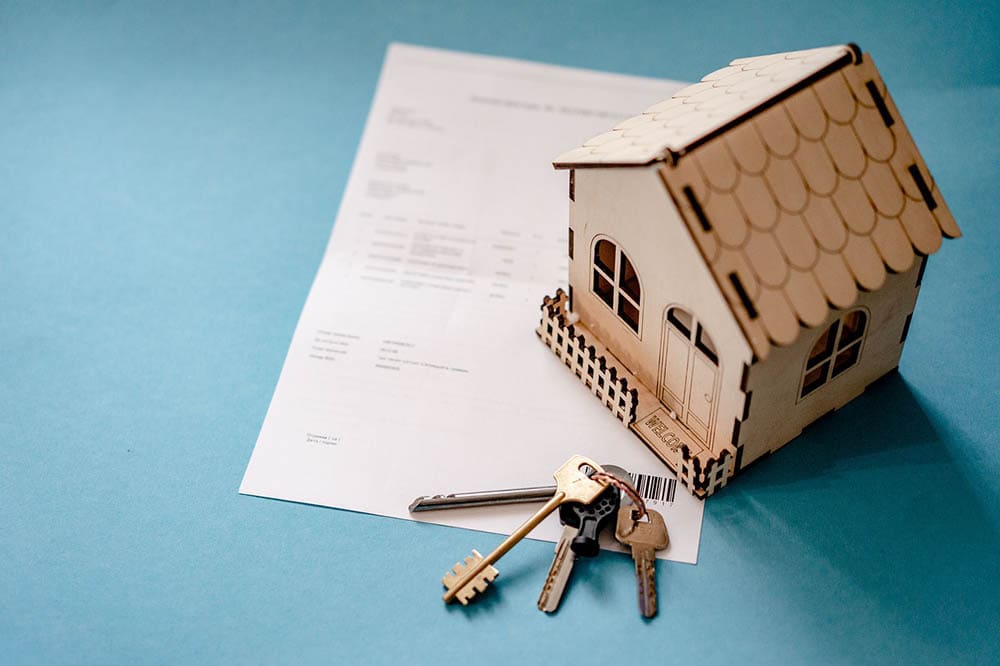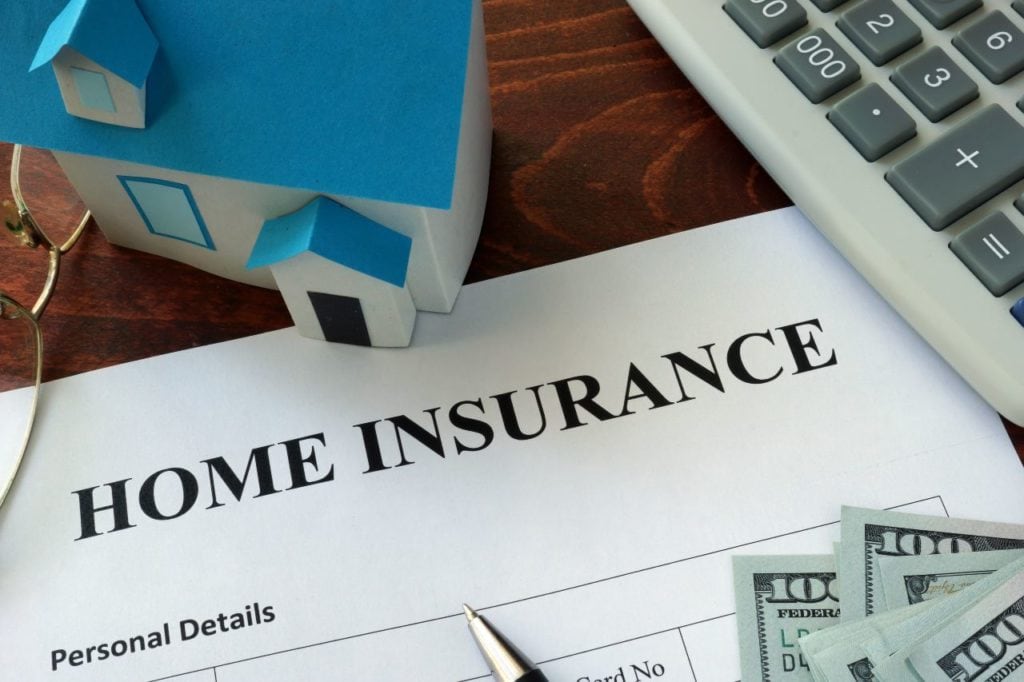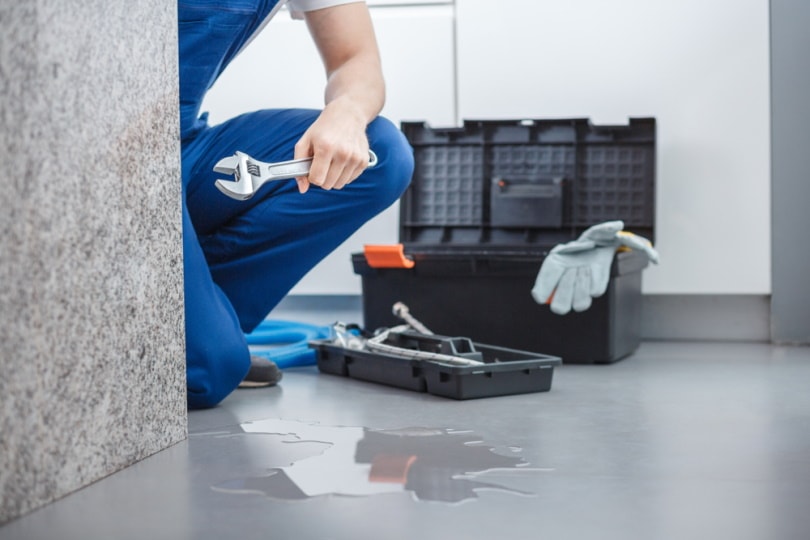Does Homeowners Insurance Cover Plumbing? Types, Tips, & FAQ
-
Jeff Weishaupt
- Last updated:

While homeowners insurance covers you in case of accidental damage, such as a burst pipe, it does not cover slow leaks or similar problems resulting from lack of maintenance or long-term neglect.
Let’s say your home’s water line or water heater springs a slow leak. You might not notice the leak for months, but the damage is significant by the time you do.
Your homeowner’s insurance policy will not cover the damage because it is considered a result of your negligence, not an accident. However, it will cover plumping if the water heater ruptures or the water line bursts suddenly.
What else does homeowners insurance cover? Let’s explore.

What Is Homeowners Insurance?
Homeowners insurance is a type of property insurance that covers a private residence. It is an insurance policy that combines various personal insurance protections, including losses occurring to one’s home, its contents, loss of use, or personal liability.
A standard homeowners insurance policy insures the home itself and the things you keep in it. For instance, your clothes, furniture, and other personal items are covered if they’re stolen or destroyed by fire, hurricanes, or other disasters listed in your policy.
If you have to move out of your home because it’s being repaired, your policy will help pay for additional living expenses. Likewise, if someone gets hurt on your property and sues you, your insurance policy will help pay for their medical expenses and any damage they win in court.

Does Homeowners Insurance Cover Plumbing Issues?
Yes, but only in some cases. If the issue is due to accidental or sudden damage, like a burst pipe, then it will be covered. However, it won’t be covered if it is a preventable problem, such as a slow leak.
Meanwhile, if the water damage is due to a neighbor’s plumbing or a handyman’s work on your property, their insurance would be responsible, not yours.
How Does Your Homeowners Insurance Policy Cover Plumbing-Related Damage?
There are different types of homeowners insurance policies, and each is different regarding what types of damage are covered.
- Personal Liability: Such coverage protects you if you, a family member, or your pet causes damage or injury to someone else. Suppose a pipe bursts in your home and damages your neighbor’s property. If they sue you, this coverage will pay for your legal expenses up to the limit stated in your policy.
- Dwelling Coverage: It covers the physical structure of your home, including the roof, walls, and floors. Dwelling coverage would reimburse you for the repairs if a pipe bursts and damages your flooring.
- Other Structures: If you have a detached garage or shed, this coverage will cover the cost of repairs if they’re damaged by a plumbing-related issue.
- Loss-of-Use: If you cannot live in your home because of plumbing-related damage, loss-of-use coverage provides additional living expenses, like a hotel stay.

Which Plumbing Issues Does Your Homeowners Insurance Not Cover?
Not all plumbing issues are covered by homeowners insurance. In most cases, coverage depends on the cause of the problem.
- Flooding: If excessive rainfall causes water to seep into your home through the foundation, homeowners insurance typically won’t cover the damages. You should get an individual flood insurance policy if you live in an area prone to flooding.
- Sewer and Drain Backup: Sewer backup can result in significant water damage. Unfortunately, this damage is often excluded from standard homeowners insurance policies.
- Negligence: Suppose you hire a plumber to fix a leaky pipe, but the plumber does not properly fix the issue. If the pipe bursts and causes water damage, your homeowners’ insurance company may deny your claim because it was caused by negligence.
- Wear and Tear: Water pipes and other plumbing components wear out over time. Homeowners’ insurance usually doesn’t cover repair or replacement costs for these issues.
Which Additional Coverage Can You Get to Cover Plumbing Problems?
Since homeowners insurance does not cover every type of repair, you may want to consider additional coverage for your home. Here are some insurance coverages to consider:

Water Backup Coverage
A water backup endorsement or a rider on your home insurance can protect you from loss due to backed-up sewers, drains, or other water sources. Such coverage is especially important if you live in an area with a high water table or poor drainage.
Backing up of the sump pump or sewer can lead to flooding in your basement. In such a situation, you would have to bear the cost of repairs and replacement if you don’t have water backup coverage.
Mold Damage Rider
An insurance rider is a separate insurance policy that can be attached to your existing home insurance. For example, a mold damage rider will cover the cost of mold removal if your home is damaged by mold.
Mold can cause serious health problems, so it is essential to have coverage in case your home is infected.
Replacement Cost Coverage
Most home insurance policies only cover the actual cash value of your belongings. However, replacement cost coverage will reimburse you for the cost of replacing your belongings, regardless of their actual cash value.
For example, if you have a television that is five years old and it is damaged due to water damage, your home insurance policy will only reimburse you for the current value of the television, which may be much less than the cost of buying a new one. However, if you have replacement cost coverage, you will be reimbursed for buying a new television.

Flood Insurance
If you live in a flood-prone area, you may want to consider buying flood insurance. Flood insurance protects you and your belongings from damage caused by flooding.
Service Line Coverage
Service line coverage covers the cost of repairing or replacing the water and sewer lines that connect your home to the main utility lines. It includes steam, water, drain, and sewer pipes. You can add this rider to your current homeowners’ insurance for a small annual fee.

How to Lower the Risk of Plumbing Issues in Your Home
Your insurance will not cover the cost of plumbing issues if they’re caused by neglect. Thus, if you don’t want plumbing costs to break the bank, it’s imperative to take active steps to prevent potential problems. Here are four tips for doing just that:
1. Fix Drips and Leaks Immediately

If you notice a drip or leak in your home, don’t wait to fix it. Plumbing problems never get better on their own. Instead, they only get worse and more expensive the longer you wait.
Make sure you hire a reliable plumber for the job because you don’t want to worsen the problem.
2. Get Annual Inspection for Pipes
The best way to prevent plumbing issues is to get an annual inspection. It will allow a professional plumber to identify potential problems before they become big.
You need to do this, especially if your home has water pipes from the 1970s through the 1990s. Since those pipes had polybutylene, they’re prone to breaking and leaking.
If you have such pipes in your home, it’s best to replace them before they cause severe damage.
3. Get a Water Monitor

A water monitor is a small device you can install in your home to track your water usage. It’s helpful because it can alert you of unusual water consumption spikes.
If you see a sudden spike, it could be an indication of a hidden plumbing leak. The sooner you catch it, the easier and less expensive it will be to fix.
4. Get Your Pipes Insulated
Lack of proper insulation is a huge concern in the winter because it can cause your pipes to freeze. When water freezes, it expands and puts pressure on the pipes, which can cause them to break or burst.
To prevent this from happening, make sure your pipes are appropriately insulated before the cold weather hits.
There are several ways you can insulate your pipes, such as with foam pipe insulation or electric heat tape. Talk to a professional to see which option is best for you.

Conclusion
Homeowners insurance only covers plumbing issues caused due to accidents, such as pipe bursts. If your plumbing is not in good working order and causes an accident, your insurance will not cover the damages. It includes damage due to wear and tear, freezing, or chronic problems like leaks. If you have additional coverage or riders, they may cover some of these issues.
Otherwise, you will have to pay for repairs or replacements out of pocket. Thus, it is advisable to keep your plumbing in good working condition.
Featured Image Credit: PaeGAG, Shutterstock
Contents